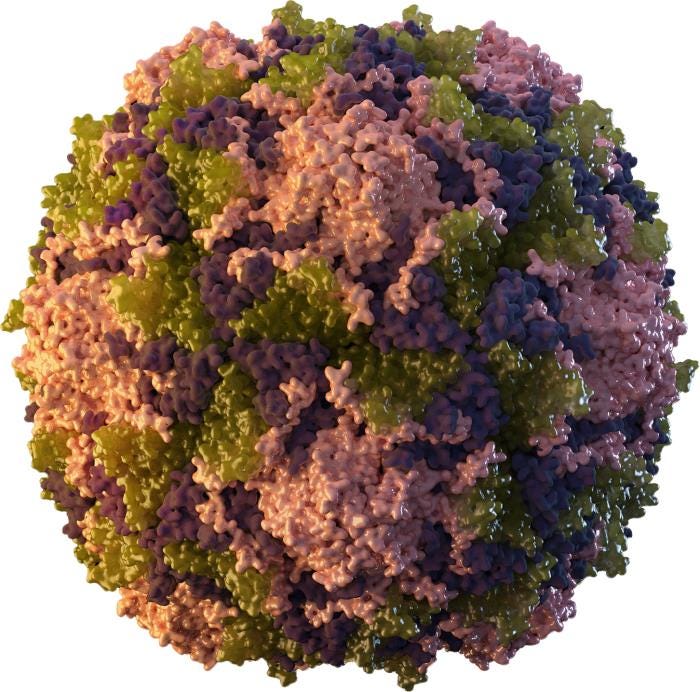POLIO NEWS UPDATE: Pakistan cases rise, 2nd round of vaccination in the Gaza Strip, Circulating variant poliovirus isolated from environmental samples in French Guiana and Spain
Pakistan
In a follow-up on the wild poliovirus (WPV-1) situation in Pakistan this year, the Regional Reference Laboratory for Polio Eradication at the National Institute of Health confirmed the detection of wild poliovirus type 1 (WPV1) from two children in Jacobabad and one child each from Karachi Malir and DI Khan districts, bringing the total number of cases in 2024 to 32.
Prime Minister’s Focal Person for Polio Eradication Ms Ayesha Raza Farooq said: “This should be a wake-up call for all parents and communities. Every paralytic polio case means there are hundreds of children who are silently affected by poliovirus and are potentially carrying and spreading it throughout their communities”.
She urged parents and caregivers to fulfil their duty of care to their children and ensure their polio vaccination when polio teams visit their homes from October 28 in a nationwide campaign to vaccinate more than 45 million children to protect children from the crippling effects of polio.
Coordinator of the National Emergency Operations Centre for Polio Eradication Mr Anwarul Haq said WPV1 has been detected from sewage samples of all these districts, indicating that the virus is widely circulating across the country.
This brings the global total of WPV1 to 54 (22 Afghanistan).
Gaza Strip
In a follow-up on the situation in the Gaza Strip, the World Health Organization reports the second round of an emergency polio vaccination campaign is scheduled to start on 14 October 2024 in Gaza, to vaccinate an estimated 591,700 children under ten years of age with a second dose of the novel oral polio vaccine type 2 (nOPV2) vaccine.
This follows a first round, which was successfully implemented from 1-12 September 2024 and vaccinated 559 161 children, or an estimated 95% of eligible children at governorate level, according to independently conducted post-campaign monitoring. As with the first round, the second round will have three phases, each involving three campaign days and one catch-up day.
A minimum of two doses of nOPV2 are needed to interrupt poliovirus transmission. However, this will only be achieved if at least 90% of all children are vaccinated in all communities and neighborhoods. In this round, vitamin A will be co-administered alongside polio vaccine, to help boost overall immunity among children between the ages of two and nine years.
cVDPV
The Global Polio Eradication Initiative (GPEI) reported last week circulating variant poliovirus (cVDPV) has been isolated from environmental samples in French Guiana and Spain.
In French Guiana, cVDPV3 was isolated from samples collected in Cayenne province in May, June and August.
In Spain, cVDPV2 was isolated from a single positive sample collected in Barcelona in September.
Human cVDPV has been reported from the following countries: Afghanistan, Algeria, Angola, Benin, Botswana, Burkina Faso, Burundi, Cameroon, Central African Republic, Chad, Côte d'Ivoire, Democratic Republic of the Congo, Egypt, Ethiopia, Gambia, Guinea, Indonesia, Kenya, Liberia, Madagascar, Mali, Mauritania, Mozambique, Niger, Nigeria, Pakistan, Republic of the Congo, Senegal, Sierra Leone, Somalia, South Sudan, Sudan, Tanzania, Uganda, Yemen, Zambia and Zimbabwe.
Subscribe to Outbreak News TV on YouTube
Polio is a crippling and potentially deadly disease that affects the nervous system. Good hand washing practices can help prevent the spread of this disease. Because the virus that causes polio lives in the feces (poop) of an infected person, people infected with the disease can spread it to others when they do not wash their hands well after defecating (pooping). People can also be infected if they drink water or eat food contaminated with infected feces.
Most people with polio do not feel sick. Some people have only minor symptoms, such as fever, tiredness, nausea, headache, nasal congestion, sore throat, cough, stiffness in the neck and back, and pain in the arms and legs. In rare cases, polio infection causes permanent loss of muscle function (paralysis). Polio can be fatal if the muscles used for breathing are paralyzed or if there is an infection of the brain.





